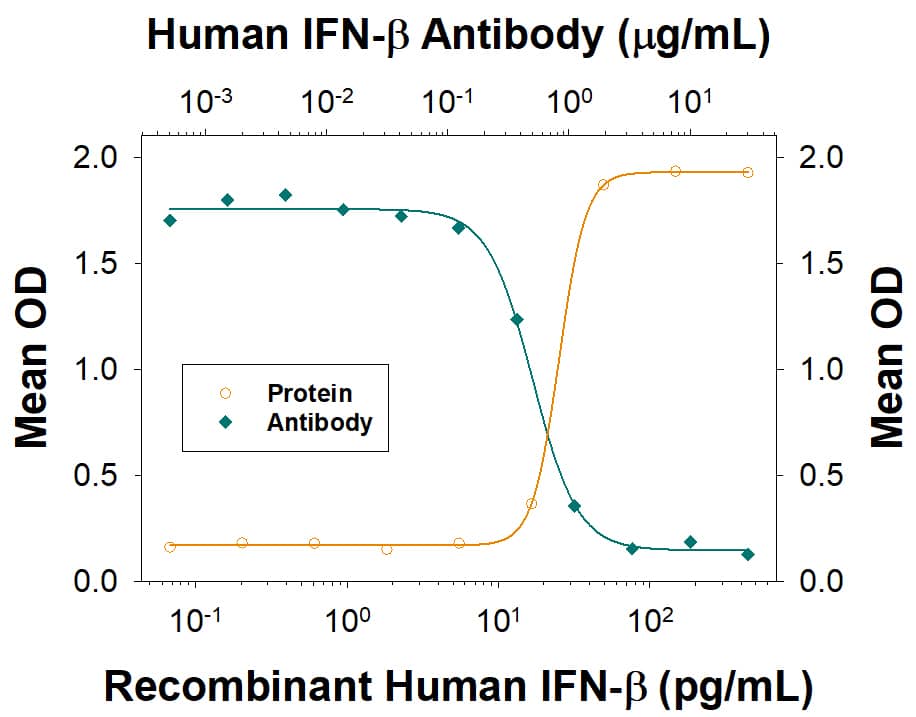Mouse IFN-beta Antibody Summary
Customers also Viewed
Applications
Please Note: Optimal dilutions should be determined by each laboratory for each application. General Protocols are available in the Technical Information section on our website.
Preparation and Storage
Background: IFN-beta
Interferon-beta (IFN-beta) is a cytokine that is produced by fibroblasts and pathogen-exposed dendritic cells, macrophages, and endothelial cells. It signals through the heterodimeric IFN-alpha/beta Receptor. IFN-beta-deficient mice show increased susceptibility to experimental autoimmune encephalomyelitis (EAE), a disease model of human multiple sclerosis (MS). Furthermore, IFN-beta has been shown to suppress the Th17 cell response in both MS and EAE and has commonly been used as a treatment for MS.
Product Datasheets
Citations for Mouse IFN-beta Antibody
R&D Systems personnel manually curate a database that contains references using R&D Systems products. The data collected includes not only links to publications in PubMed, but also provides information about sample types, species, and experimental conditions.
11
Citations: Showing 1 - 10
Filter your results:
Filter by:
-
TRIM14 is a key regulator of the type I interferon response during Mycobacterium tuberculosis infection
Authors: Caitlyn T. Hoffpauir, Samantha L. Bell, Kelsi O. West, Tao Jing, Allison R. Wagner, Sylvia Torres-Odio et al.
The Journal of Immunology
-
AIM2 controls microglial inflammation to prevent experimental autoimmune encephalomyelitis
Authors: Chunmei Ma, Sheng Li, Yingchao Hu, Yan Ma, Yuqing Wu, Chunyan Wu et al.
Journal of Experimental Medicine
-
STING Agonist Mitigates Experimental Autoimmune Encephalomyelitis by Stimulating Type I IFN–Dependent and –Independent Immune-Regulatory Pathways
Authors: Brandon M. Johnson, Toru Uchimura, Matthew D. Gallovic, Madhan Thamilarasan, Wei-Chun Chou, Sara A. Gibson et al.
The Journal of Immunology
-
CD14 is a decision-maker between Fas-mediated death and inflammation
Authors: Magri, Z;Jetton, D;Muendlein, HI;Connolly, WM;Russell, H;Smirnova, I;Sharma, S;Bunnell, S;Poltorak, A;
Cell reports
Species: Mouse
Sample Types: Serum, Tissue Homogenates
Applications: ELISA Capture -
ZBP1 promotes inflammatory responses downstream of TLR3/TLR4 via timely delivery of RIPK1 to TRIF
Authors: HI Muendlein, WM Connolly, Z Magri, D Jetton, I Smirnova, A Degterev, S Balachandr, A Poltorak
Proceedings of the National Academy of Sciences of the United States of America, 2022-06-06;119(24):e2113872119.
Species: Mouse
Sample Types: Cell Culture Supernates
Applications: ELISA Capture -
AIM2 controls microglial inflammation to prevent experimental autoimmune encephalomyelitis
Authors: Chunmei Ma, Sheng Li, Yingchao Hu, Yan Ma, Yuqing Wu, Chunyan Wu et al.
Journal of Experimental Medicine
Species: Mouse
Sample Types: Cell Culture Supernates
Applications: ELISA Detection -
Constitutive Interferon Maintains GBP Expression Required for Release of Bacterial Components Upstream of Pyroptosis and Anti-DNA Responses
Authors: BC Liu, J Sarhan, A Panda, HI Muendlein, V Ilyukha, J Coers, M Yamamoto, RR Isberg, A Poltorak
Cell Rep, 2018-07-03;24(1):155-168.e5.
Species: Human, Mouse
Sample Types: Cell Culture Supernates
Applications: ELISA Development (Detection) -
Evaluating vaccinia virus cytokine co-expression in TLR GKO mice.
Authors: Sutherland DB, Ranasinghe C, Regner M, Phipps S, Matthaei KI, Day SL, Ramshaw IA
Immunol. Cell Biol., 2010-12-21;89(0):706-15.
Species: Mouse
Sample Types: Serum
Applications: ELISA Development -
A role for Stat1 in the regulation of lipopolysaccharide-induced interleukin-1beta expression.
Authors: Joshi VD, Kalvakolanu DV, Chen W, Zhang L, Kang TJ, Thomas KE, Vogel SN, Cross AS
J. Interferon Cytokine Res., 2006-10-01;26(10):739-47.
Species: Mouse
Sample Types: Serum
Applications: ELISA Development -
Neutrophils and macrophages drive TNF-induced lethality via TRIF/CD14-mediated responses
Authors: Hayley I. Muendlein, Wilson M. Connolly, James Cameron, David Jetton, Zoie Magri, Irina Smirnova et al.
Science Immunology
-
O-GlcNAc Transferase Links Glucose Metabolism to MAVS-Mediated Antiviral Innate Immunity
Authors: Tianliang Li, Xinghui Li, Kuldeep S. Attri, Changhong Liu, Lupeng Li, Laura E. Herring et al.
Cell Host & Microbe
FAQs
No product specific FAQs exist for this product, however you may
View all Antibody FAQsReviews for Mouse IFN-beta Antibody
There are currently no reviews for this product. Be the first to review Mouse IFN-beta Antibody and earn rewards!
Have you used Mouse IFN-beta Antibody?
Submit a review and receive an Amazon gift card.
$25/€18/£15/$25CAN/¥75 Yuan/¥2500 Yen for a review with an image
$10/€7/£6/$10 CAD/¥70 Yuan/¥1110 Yen for a review without an image











